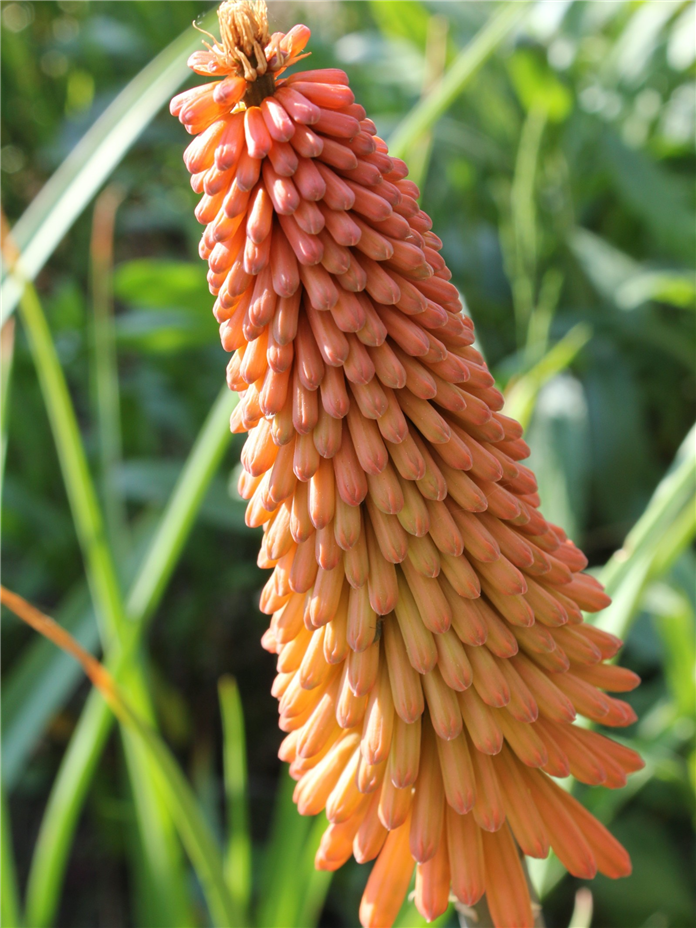- Are Red Hot Poker Plants Toxic To Cats Vomit
- Are Red Hot Poker Plants Toxic To Cats Bite
- Are Red Hot Poker Plants Toxic To Cats Litter
- Are Red Hot Poker Plants Toxic To Cats Eat
Common Name: Red hot poker Genus: Kniphofia Species: caulescens. The 1m tall flowers arrive in late summer and are yellow and coral red. This plant is toxic If eaten and can irritate eyes and skin. Toxic Plants For Cats. Poisonous Plants For Cats: Although sometimes you are tempted to offer your cat some of what you are eating, you must bear in mind that the best way to feed it is through the combination of dry and wet feed. This solution is the only one that can guarantee that your cat will not eat any prohibited food that could harm it. The red hot poker is a showy and dramatic plant. If you love growing perennials that give color all summer long, this is the plant for you. Other names for this showy plant are torch lily and poker plant. The botanical name for this plant is kniphofia uvaria and there are more than 70 known species of it.
New gardeners and old love the red hot poker plant (Kniphofia uvaria, aka torch lily). Hailing from South Africa, the plant is often found in USDA hardiness zones 6 to 9.
Its showy flower spikes attract butterflies and hummingbirds. This makes red hot pokers a perfect addition for many garden settings or as border plants.
Some of the 70 species have bi-colored red to yellow flowers. Others have orange flowers, and others range from white to a variety of pastel colors.
Red hot poker plants don’t like growing in containers. Except for a few dwarf varieties, you’ll generally grow them outdoors.
Add new plants to the garden in early spring to start off the growing season. Blooms appear in early summer.
As long as it gets full sun and a well-drained soil type covered in rich, organic mulch, plant care is minimal.
The plants live quite a long time if you deadhead spent flower stalks. Tie spent leaves over the plant in late fall to help it overwinter.
The biggest draw of this plant is its use for flower arrangements and as cut flowers.
Lilies are toxic plants, there’s a lot of concern that displays may be dangerous around children and pets.

Is The Red Hot Poker Plant Poisonous or Toxic?
The good news is that torch lilies aren’t true lilies and are non-toxic to both humans, pets, and livestock. The bad news is that many plants commonly planted with these plants are.
Try to avoid placing the blooms of a true lily plant in the same arrangement as the torch’s tubular flowers. Daylilies are also believed to be highly toxic to cats and cows, so avoid these as well.
Canna lilies are safe around pets and make wonderful companions to red hot poker plants.
Marigold blooms also go well with torch lily displays. They are generally considered non-toxic (but may cause some mild stomach irritation in dogs).
What Parts Of The Plant Are Poisonous or Toxic?
While it’s not recommended for you or your pets to consume this plant, there are no toxic parts.
Are Red Hot Poker Plants Toxic To Cats Vomit
One concern of ingestion, especially in larger quantities, is calcium oxalate. This substance is a leading cause of kidney stones and found in a wide range of garden plants.
What Are The Symptoms Of Poisoning?
Ingestion of torch lilies will not harm you or your pets, but many companion plants will.
If your pets or livestock have been snacking on these plants and you have true lilies nearby, watch out for:
- Nausea
- Vomiting
- Diarrhea
- Excessive drooling
- Fever
… as these are the most common symptoms of plant toxins.
How To Protect Yourself While Handling The Red Hot Poker Plant
Torch lilies are safe to work with, but one of the best growing tips is to always use gloves and sterile tools.

Is The Red Hot Poker Plant Poisonous or Toxic?
The good news is that torch lilies aren’t true lilies and are non-toxic to both humans, pets, and livestock. The bad news is that many plants commonly planted with these plants are.
Try to avoid placing the blooms of a true lily plant in the same arrangement as the torch’s tubular flowers. Daylilies are also believed to be highly toxic to cats and cows, so avoid these as well.
Canna lilies are safe around pets and make wonderful companions to red hot poker plants.
Marigold blooms also go well with torch lily displays. They are generally considered non-toxic (but may cause some mild stomach irritation in dogs).
What Parts Of The Plant Are Poisonous or Toxic?
While it’s not recommended for you or your pets to consume this plant, there are no toxic parts.
Are Red Hot Poker Plants Toxic To Cats Vomit
One concern of ingestion, especially in larger quantities, is calcium oxalate. This substance is a leading cause of kidney stones and found in a wide range of garden plants.
What Are The Symptoms Of Poisoning?
Ingestion of torch lilies will not harm you or your pets, but many companion plants will.
If your pets or livestock have been snacking on these plants and you have true lilies nearby, watch out for:
- Nausea
- Vomiting
- Diarrhea
- Excessive drooling
- Fever
… as these are the most common symptoms of plant toxins.
How To Protect Yourself While Handling The Red Hot Poker Plant
Torch lilies are safe to work with, but one of the best growing tips is to always use gloves and sterile tools.
This helps prevent cross-contamination from rhizomes or other infected or infested plant parts.
Contents
- 3 Poisonous plants for cats
Toxic Plants For Cats
Poisonous Plants For Cats: Although sometimes you are tempted to offer your cat some of what you are eating, you must bear in mind that the best way to feed it is through the combination of dry and wet feed. This solution is the only one that can guarantee that your cat will not eat any prohibited food that could harm it.
What we may not know is that these species can pose a threat to our cats. They are very curious animals and they love nibbling plants. Kittens have a greater danger because they like to investigate everything and do not put limits on their curiosity. A cat that sale of house surely is more selective or at least has option to choose which plant bites (although this does not exempt of a possible intoxication). But one who lives in the interior only has access to those plants that we introduce into our homes.
The toxicity of the different plants occurs according to the part they ingest. There are certain toxic species in their entirety (leaves, flowers, roots / bulbs, seeds) and others that only one of the parties presents a risk, such as fruits. According to the toxic principle of each plant we can find different types of disorders: digestive, neurological, cardiac or dermatological and ocular.
Foods Probhibited for Cats
Are Red Hot Poker Plants Toxic To Cats Bite
There are a number of foods that are extremely dangerous for cats, and that can seriously damage your health. The main ones are:
- Chocolate: contains theobromine, which is an alkaloid stimulating the central nervous system. Once ingested, it takes a long time to be eliminated from the body of the cat, and can produce an acceleration of the heart rate, excitation, diarrhea, vomiting, and even death.
- Caffeine: is another stimulant of the nervous system of cats and, as such, can cause important disorders in it. Its effects are manifested through restlessness, accelerated breathing, palpitations, seizures, and diarrhea.
- Chicken bones cooked, boiled, or roasted: they are not toxic to cats but they can be harmful, because chicken bones are easily splintered, and can cause havoc in the mouth or digestive system.
- Onion, chives, leeks and garlic: they contain thiosulfate, which is a compound that damages red blood cells. If you supply any of these foods to your cat, either in large doses or continuously, you can cause anemia or gastrointestinal problems, manifested by weakness, anemia, inappetence, vomiting, and apathy.
- Beer and alcohol in general: in small doses, it is not lethal, but if your cat takes it, it can suffer drowsiness, disorientation, urinary incontinence and even develop aggressive behaviors.
- Avocado: without becoming toxic, it is harmful because excess fat can cause feline stomach disorders or pancreatitis.
- Nuts: regardless of whether they contain salt or not, it is discouraged for cats to consume them in the event that they develop kidney failure, vomiting, diarrhea and other digestive problems.
Poisonous plants for cats
The list of the main poisonous plants for cats are the following:
- Flower or Christmas plant.
- Eucalyptus.
- Lily.
- Marijuana.
- Ivy.
- Tulip.
- Azalea.
- Hydrangea.
- Jacinto.
- Laurel.
In contrast, there are other beneficial plants for cats, with very positive effects for their health. Among the most relevant, stand out:
- Chamomile: useful for problems related to the gastrointestinal tract, wounds and eye cleaning.
- Ginger: relieves digestive disorders and is effective for feline cold.
- Wheat, oats or barley: essential vegetables so that your cat can purge itself, regurgitate dead hairs and other substances ingested when they clean themselves.
- Nepeta cataria (Nébeda), also called catnip: it is a plant that produces attraction in most cats due to its smell, very similar to that of mint. If your cat ingests it, its nervous system will be stimulated and you will be able to observe behaviors similar to those carried out by cats during the breeding season. In the market they are marketed in different ways, by means of snacks, prepackaged or in seeds with a pot.
- Holly: The holly, which is a small tree known by its bright red fruit that are used as Christmas ornament produces toxicity if both leaves and fruit and seeds are ingested. The holly contains saponins and with a minimum dose that they ingest, already symptoms of intoxication would be produced that generally are gastrointestinal.
- Mistletoe: The mistletoe, popular for bringing good luck and happiness to lovers kissing beneath it, has relatively toxic white fruits, although it requires a higher intake to produce a significant intoxication. Mistletoe contains viscotoxin and this can produce from gastrointestinal disorders by irritation, cardiovascular damage, collapse, bradycardia (low heart rate) and dyspnea (respiratory distress).
Are Red Hot Poker Plants Toxic To Cats Litter
Other Articles on cats
Symptoms When Cats Eat Poisonous Plants
If your cat loves to nibble the leaves of plants you should be careful, since there are many varieties that can be toxic or poisonous, causing eye damage, dermatitis, digestive disorders, kidney, and even disturbances of the nervous system. For this reason, it is important that you go immediately to the veterinarian if you observe any of the following symptoms after the ingestion:
Are Red Hot Poker Plants Toxic To Cats Eat
- Inapetencia.
- Irritations on the skin and eyes.
- Vomiting.
- Lethargy.
- Intense salivation.
- Diarrhea.
- Dehydration.
- Respiratory problems.
- Abdominal pain.

